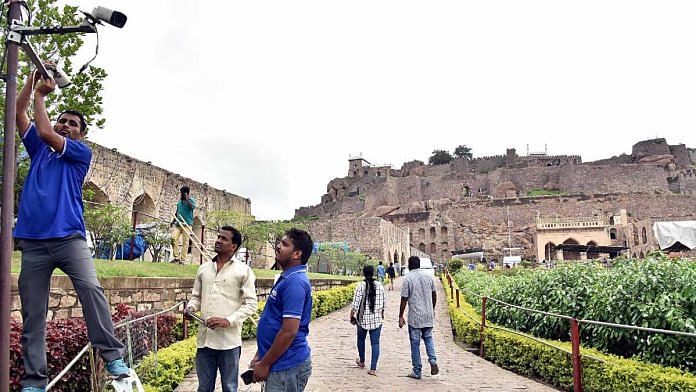Hyderabad: Global human rights organisation Amnesty International said Wednesday that Hyderabad, with its extensive CCTV coverage and facial recognition technology, is on the brink of becoming a total surveillance city where human rights would be at risk. The Telangana Police, however, take pride in the lakhs of cameras in the city, adding that they have helped make the city safer and cut down on crime rate.
There are over 3.7 lakh CCTV cameras in Hyderabad.
Amnesty, as part of its ‘Ban the Scan’ campaign that seeks to restrict “intrusive facial recognition technology”, has called for a total ban on “state and private sector use, development, production, sales, and export of facial recognition technology for mass surveillance purposes”.
Surveillance has been a key focus area of Chief Minister K. Chandrashekar Rao ever since Telangana was created in 2014. At the time, he had promised 10,000 CCTV cameras would be installed in Hyderabad alone. Now, there are an estimated 8.3 lakh cameras in the state, over 50 per cent of the 15 lakh target.
Among other things, Amnesty has red-flagged the upcoming Police Command Control Centre (CCC) in Hyderabad’s plush Banjara Hills locality, next to the office of the ruling Telangana Rashtra Samithi. The CCTV cameras installed across the city will be connected to the CCC for live footage monitoring.
“In addition to CCTV, we are concerned that law enforcement’s practice of using tablets to stop, search and photograph civilians without charge could be used for facial recognition,” it said, adding that Telangana has been a test site for increased usage of dangerous facial recognition technologies (FRT) against civilians in recent years.
The police, however, say the technology has helped crack down on crime.
“Maximum crime detection is through CCTVs and they act as strength to the investigation. Even false reporting of a crime is detected through CCTVs. It is not possible to get direct witnesses all the time and CCTVs come in handy,” Rachakonda Police Commissioner Mahesh Bhagwat told ThePrint.
Rachakonda is one of the three police commissionerates located in Hyderabad.
“It is a known fact that the country does not have adequate policemen for the population and it is not possible for police to be present everywhere and that is when CCTV cameras come in handy. For us, one CCTV is equal to 100 policemen,” he added.
Bhagwat pointed to the state’s Public Safety Enforcement Act (2013), which mandates that any establishment where over a 100 people gather will have to install CCTV surveillance cameras and provide access to the footage to the local authorities.
ThePrint reached Hyderabad Police Commissioner Anjani Kumar by phone call but he refused to comment on Amnesty International’s statement.
Also Read: ‘CCTV project a voyeur’s dream, will lead to surveillance state’: Delhi govt gets legal notice
Not the first time
The police in Telangana have been stating that crime in the state has come down over the past few years.
In the annual state police report for 2020, they said there has been a 6 per cent decrease in overall crime compared to 2019, and a 19 per cent increase in conviction rates.
According to official data available with ThePrint, police said 4,490 cases in 2020 were detected through CCTV footage. Out of 1,511 photographs of suspects, about 154 were matched through facial recognition apps, they added.
In 2019, Hyderabad Police said crime in the city decreased by 3 per cent compared to the previous year, with 2018 also registering a 6 per cent drop.
This is not the first time that police in the state have drawn criticism for excessive surveillance. Just last month, police in Hyderabad faced backlash for scanning the phones of random commuters — including their chats — as part of their anti-drug drive.
“Hyderabad has become ground zero for all sorts of surveillance technology experiments. Facial recognition is a very invasive form of surveillance and police in Hyderabad have been collecting images of citizens without any law or regulation,” independent digital rights activist Srinivas Kodali told ThePrint.
(Edited by Sunanda Ranjan)
Also Read: Jubilation over number of CCTVs is bizarre. India needs to make privacy laws, not become China



